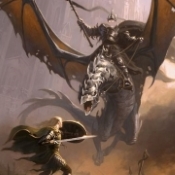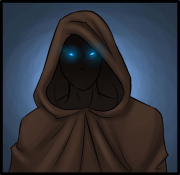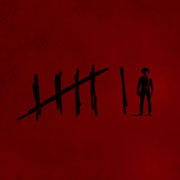|
TK_Nyarlathotep posted:Oh it's real bad and it only gets moreso from here. I remember attempting to read it years back and skimming because it is just a DRASTIC disconnect from the Paranoia I know and love. Even if utilizing the Straight variant from XP it's still got a lot of stupid incongruities. I think for me it's (besides the art being so distracting that it's hard to understand what's happening) is that, in the RPG, while Alpha Complex is a dystopia, it's a dystopia with a veneer of forced happiness on top of it. Happiness is mandatory and the Computer is your friend, after all. I'm not getting any of that here so far. Paranoia works because it's a satire (although of what can change edition to edition, adventure to adventure; sometimes bureaucracy, sometimes capitalism, sometimes communism, sometimes McCarthyism, sometimes hacker culture). This....isn't.
|
|
|
|

|
| # ? Apr 23, 2024 15:00 |
|
Tasha's Cauldron of Everything #4: A GM Section in the Player Book There are four chapters in this book and we've finally made it to the last one. This still being Tasha's, we need to open with a little disclaimer that all of this stuff is optional and the developers would never dream of creating actual rules you couldn't arbitrarily change because you got high on peyote and had a dream where a fighter kicked you in the nuts so you had to nerf them viciously. The book opens with session zero, which is...honestly fairly decent advice. They encourage you to recommend your players take different classes so "the adventuring party has a range of abilities" and pretend 5e's backgrounds are something you actually interact with rather than just kinda awkwardly eyeballing to figure out which of the skills involved match your DM's favorite words. There's a little section on party formation where you're given a list of questions about the party's relationships, with - of course - a six option rollable table to generate your party's origin ranging from shared enemy to meeting at a festival. They then point forward to the sidekick system which is a barrel of fun I'll get to in a moment. The social contract section is where my eyes nearly popped, as so far it delivered what the rest of the book hadn't - actually decent content. I can't believe they put this in a 5e publication posted:-You will respect the players by running a game that is fun, fair, and tailored for them. You will allow every player to contribute to the ongoing story and give every character moments to shine. When a player is talking, you are listening. This is incredibly strange to me with 5e's promotion of "DM Empowerment" and their aggressive courting of people like the RPGSite which is basically the home of grognardy old bad DMs. There's a section on soft and hard limits and how maybe sexual violence and slavery might make people uncomfortable at the table, or how shouting like a dumbass and throwing dice shouldn't be tolerated along with "dice-sharing" and the old standby of "rules lawyering" - which is endemic to 5e's very nature as the "no rules" edition as people try to figure out how the hell stealth works. Oops! There's a bit more on game customization, where the game tries to pretend that it provides rules for exploration and social roleplaying and we smile and nod, a section on house rules (best as experiments), and next the Sidekick chapter. Sidekicks: Ability drain is back on the menu The sidekick system combines the NPC classes of 3.5 with the generic arbitrariness of 5e monsters to create an awkward abomination that no one really likes. The idea is that the DM can create a DMPC or secondary character for the party by slapping NPC levels on a monster. However... Tasha's posted:You decide who plays the sidekick. Here are some options: Not only is this a DM tool, it's an alternate means of PC generation balanced only by the "optional" tag and it's completely bonkers. There are three classes, the expert, the spellcaster, and the warrior. The expert is a skill monkey class, which can help as a bonus action, use cunning action, and deal extra damage when it helps. It's not great unless your DM is kind enough to make 5e skills actually matter. The spellcaster gets half casting off a list of their choice - wizard or druid AND cleric or bard AND warlock which determines their casting stat. They get the ability to add their spellcasting ability mod to spell damage and...yeah, that's about it. I'm fairly certain you don't want them casting attack spells for reasons I'll get into later. The warrior is a boring autoattack class that sill manages to be better than Champion Fighter. For starters, at first level they can either pick the protection fighting style or a straight up +2 attack bonus to every single attack roll they make. If you could multiclass these sidekick classes literally every warrior would take a one level dip in this class. They get second wind, improved critical at 3rd level, advantage on initiative rolls, +1 AC, and extra attack with a third at 15th level. Seriously, this is 100% better than the Champion Fighter until very late in the game, and even then it's got higher melee attack rolls. It's nuts! But wait, there's more! What I didn't mention is that these classes can be applied to any monster in the game that has a challenge rating of 1/2 or less. Now, compared to low level PCs, CR 1/2 monsters can do some fairly bonkers stuff that the game was never meant to handle. The shadow is my personal favorite example, as it drains 1d4 strength on every hit, has an immunity list as long as my arm, and can crawl through small spaces. The cockatrice petrifies on hit. The only thing stopping you from rolling one of these bad boys is your ability to argue with the DM, and even if you roll something moderately sane like a skeleton warrior because you think skeletons are cool it's still a better fighter than some of the PHB characters. Now, I have no idea if these things can take feats or not, but that's OK, because the hard work is once again pushed off as "DM Empowerment". The next section is about parleying with monsters. Lest you be too concerned that the authors of Tasha's wrote something that might be useful, it's just a suggestion that if the players roll a monster research skill (with various skills provided for the various types of monsters) they might be able to learn what the monster wants which will give them...a whopping advantage on ability checks made to communicate with the creature. Friends is a 0 level spell that gives that with no resources at all. I completely understand that Dungeons and Dragons has perennially failed at social mechanics, from the magical Diplomancer of 3.5 who could turn armies into slaves by opening his mouth to the abject failure of 4th edition's skill challenges, but I'm unclear as to why the developers continue to add Deception, Persuasion, and Intimidation to the list of skills when the mechanics invariably turn out to be "uhhh....a 19 sounds like a high number...the princess agrees that you can have an affair with her but only if there's no kissing". Then they usually turn around and explain that if you think Sarah gave a really good speech and rolled a 1 to outright ignore the roll. What a mess. There's an entire section on environmental hazards. The book suggests that the DM should have wacky, wild magic-esque stuff happen on a set series of triggers to when the DM arbitrarily decides. The Blessed Radiance effects include random buffs, random healing, and a random flying sword that shows up to gank fiends, aberrations, or undead. We of course have the Far Realm, the uninspired pop-Lovecraft trash which gets the players random madness effects or attacked by faux-Cthulhus. There's a table for haunted areas, insect-infested areas (do YOU like random, unpreventable diseases or being polymorphed into a giant spider?) a mirror zone which is less like Star Trek and more like Alice in Wonderland, a "psychic resonance" area which hands out random psychic powers, an unraveling magic zone you will never visit because it will gently caress up all your spells and magic items, and a bunch of magical phenomena which is stupid crap like deathstorms that manifest as skulls. There are a LOT of options on these tables to force people to save or become incapacitated for an hour. There are magic mushrooms, mimic colonies (every object is a mimic! Why?) emotional echoes (not to be confused with the psychic resonance or whatever) - the section's a grab bag of random environmental crap, which is a very curious choice for the players option book that comes out once every three years. There is a page of natural hazard rules, some of which is literally stuff like using spell effects to mimic disasters (chromatic orb becomes ball lightning) or using cone of cold to approximate a blizzard (huh?) and the entire thing just comes off as lazy. There's a section on puzzles you will never use because they're buried in the player options book which the players presumably read. It's nuts! They seriously advertise the book to players, but also advise the DM to use the puzzles that are solved in the book that at least one of the players presumably owns! A search for "D&D puzzle ideas" on Google yields 590,000 results, so I can only conclude that the section is here to waste space to justify the thirty dollar price tag. One of the puzzles is the walking tiles from Baldur's Gate II! It's not a useful section! That's it! That's really it! The entire book! Chapter 4 is a semi-decent essay on session zero, a bonkers sidekick system that doubles as the overpowered optional character rules you will never let your players use, a half-assed section on diplomacy mechanics worth less than a cantrip that has no clear outputs in what you can get from the monsters, a bunch of random tables to roll on to bone the players when they do extraplanar exploring, the laziest weather mechanics I've ever seen, and a selection of puzzles to fill space. There's no more of this book. Really. I'm going to talk about some meta stuff Postmortem: What Did You Expect? I legitimately do not envy the authors of this book. There's not really much you can do in the D&D 5e design space, because everything is incredibly watered down and characters are by and large not allowed to do much that doesn't involve swingy outputs and flailing at monsters that are little more than a high HP count and multiattack. Wizards has also made it very clear that the Player's Handbook is not to be touched as the balance standard (by refusing to fix the ranger) but, much like 3e and 4e, internal balance is all over the drat place where you could be something cool like a necromancer wizard ordering archers to volley fire or something garbage like a champion fighter costing the cleric more spell slots. The assassin rogue is a cool concept that people want to play, but it's thoroughly gimped by its main class feature relying on arguing with the DM whether the guy you ambushed on the toilet counts as surprised or not. There are no actual systems to work with, because it's all a collection of incomplete garbage asking the DM to patch in their favorite houserules. My favorite example is forgery. The charlatan background lets you "forge documents including official papers and personal letters, as long as you have seen an example of the kind of document or the handwriting you are trying to copy." That's all the rules text you get, but you get proficiency with the forgery kit, which can also be used to forge documents. Do I have to be a charlatan to forge things? If I use the charlatan feature, do I need to roll? No one knows. I don't know, and you don't know - not because we're stupid, but because the 5e developers went out of their way to ensure that rules were unclear in what seems to be a deliberate attempt to obfuscate how they actually function. The stealth sidebar in the PHB mentions knocking over a vase, but there's no actual way from the text for your characters to knock over a vase from a stealth roll. To understand why, we need to go to the origins of 5e. Mearls seems to have the idea that 4e failed because it was too complex, and thus spouted endless ideas about how the rules would be opt-in complexity subsystems for various things that would magically be balanced so you could play a fighter with complexity 4 feats and complexity 2 manuevers against some guy's complexity 9 spell point wizard and it was going to all be opt in and if this sounds like complete bullshit, you're right! Remember, this is coming from the man who attempted - and failed - to fix 4e skill challenges twice and who blamed the community's apathy on creating a perfectly balanced game, which is loving rich for a game where people discovered an infinite damage exploit before the books were in stores. Now, we could stop there with the observation that the 5e developers were incompetent, but creating a good game was never the end goal of the 5e project. The idea was to create something that had just enough of your favorite edition and make a big cargo cult, which is why people like Monte Cook, Zak S the Chick Fil-A poop man, and the RPGPundit got brought on board while they rereleased the 3rd edition books to sell while "vigorously playtesting" 5e. The lesson Mearls took away from 4e and the Essentials seems to have been that Wizards can't make good mechanics, so why bother trying? It shows! Because there's no internal balance idea of what a character at X level can contribute (the PHB compares getting sixth level spells with getting extra attacks, a hilarious dichotomy where one person can use mass suggestion to neutralize an entire fight while the other gets to do slightly more damage), much less what each class is supposed bring to the table, the subclasses in this book are all over the place. Some of it is uncreative crap like The Battlemaster But With Psionics instead, some of it is completely worthless garbage like Phantom, some of it is clear powercreep like Genie Warlock or the sorcerers, and there's no mechanics that make me go "this is cool." As a whole the book pushes character power up quite a bit, with flying mages, artificers who break boundless accuracy, more classes getting access to animate dead, and spell DCs going wayyyy up! Nobody seems to have realized that the role and level system in 4e gave them a template for designing some kind of system where you could figure out what, say, a level 5 controller was supposed to do against level 5 monsters - but they didn't get this right in 4e either, having a good idea but botching it in execution. Hell, the custom lineage rules alone make level 1 characters much more powerful then they were before and let them pick up more feats after level 4. It's a mess all around. Performative Allyship This deserves its own section. The D&D team released this statement about how in the wake of the protests and publicized police executions they were going to take a stand for racial justice by providing rules to make black elves that were as smart as white elves. My skepticism was aroused when they listed this as an entirely new product rather than just errataing the PHB to let people swap racial modifiers, and the fact that the rules are just swapping modifiers is a source of amusement to me. Nevertheless, Wizards proceeded with the Facebook ads and the various marketing materials that proclaimed this was a new era of diversity in D&D land and finally you'd be able to play a dragonborn rogue and tell stories about something other than being the guy who lost the genetic lottery in Gattaca. Then they hosed it up. The introduction to Tasha's Cauldron explicitly says that everything in the book is optional. This includes the racial ability score rules the book points out are there to reinforce archetypes. This isn't a change to the rules you have to use, this is an optional change that you can maybe use. It's the equivalent of telling people they don't have to put a whites only sign in their restaurant, but if they have the whites only sign then no one is going to do anything about it. Now, it's a little silly to assume that Wizards is going to go to people's houses and break up their games, but there's no verbiage in the book to the effect of "these are now the official rules for the game and if you don't let people play what they want that's a house rule and that's on you." These rules are allowed for Adventurer's League, and while that's a start, the entire section is full of weasel words about how most elves conform to stereotypes. I'm not impressed that I had to pay an additional 30 dollars for something the PHB should have done in the first place, I'm not impressed that Wizards doesn't have the guts to stand behind these rules, and I'm thoroughly disgusted by how hard Wizards marketing portrayed this as a great social justice advance when they're too cowardly to commit to it. What a failure of a book.
|
|
|
|
|
TheGreatEvilKing posted:Postmortem: What Did You Expect? A few years ago a friend asked me to describe 5th edition to him and I said "It's the most thoroughly mediocre edition of D&D I've seen yet" and I stand by that statement. I have no idea why people think that 4th edition was complicated, it's not. Everything is on the rails simple besides the cover system and flanking, but neither is complex so much as tedious. I've seen people say this same poo poo in Discords I'm in too and I have no idea where they're getting this poo poo from. Your postmortem is dead on.
|
|
|
Ithle01 posted:A few years ago a friend asked me to describe 5th edition to him and I said "It's the most thoroughly mediocre edition of D&D I've seen yet" and I stand by that statement. The last point is relatively fair but, you know, it did it well.
|
|
|
|
Ithle01 posted:I have no idea why people think that 4th edition was complicated, it's not. Everything is on the rails simple besides the cover system and flanking, but neither is complex so much as tedious. I think I can explain this one. 4th edition is exponentially easier to play if you have the character builder and roll20. Building a character from the books in 4e is an exercise in frustration - I want to pick a race that has both good ability scores for my class and ideally useful racial feats, but I can't use the PHB as Essentials errata'd all of the races to have stat option choices. If you have the character builder it's easy to look for all the feats across all the books so you can plan your ability scores for poo poo like Double Implement Wielder which needs 13 dex, but you also want enlarge spell (13 wis) and spell focus (13 cha) while keeping your int high for wizarding and AAAAAAH! Then you need to download the errata for your books and check to make sure that everything works the way it's printed. I sure hope you weren't making a star pact warlock. The other thing is all of the minor buffs and effects that get generated from round to round can be very annoying to keep track of when you've got a full party handing out buffs and statuses that all have varying durations of end of turn, beginning of turn, and whatever I saved for what. This is super easy if you're playing over roll20 and can tag icons, but me staring at the orc minis trying to remember which was orc number 1 and was weakened vs orc number 2 being dazed and tagged by lance of faith vs...you get the picture. This one really depends on party composition. Of course, picking out actual points in the edition wars vs "4e killed my chef! I can't be a REAL roleplayer" is actually kind of difficult.
|
|
|
|
|
TheGreatEvilKing posted:I think I can explain this one. 4th edition is exponentially easier to play if you have the character builder and roll20. Building a character from the books in 4e is an exercise in frustration - I want to pick a race that has both good ability scores for my class and ideally useful racial feats, but I can't use the PHB as Essentials errata'd all of the races to have stat option choices. If you have the character builder it's easy to look for all the feats across all the books so you can plan your ability scores for poo poo like Double Implement Wielder which needs 13 dex, but you also want enlarge spell (13 wis) and spell focus (13 cha) while keeping your int high for wizarding and AAAAAAH! Then you need to download the errata for your books and check to make sure that everything works the way it's printed. I sure hope you weren't making a star pact warlock. That's a good point, I don't really think of it as complexity so much as tedium. Like, there are a lot of effects and loads of powers, but they tend to be mutually exclusive in terms of your character load out so the amount of stuff you need to know at any given moment is fairly small. I sometimes forget about the volume of character options that D&D games to produce so I'm not really upset about Mearls deciding he doesn't want to publish more books and that's one of things I think of as a plus for 5th edition. Alright I guess the complaint people have about 4th edition complexity is a fair one and I had hand-waved it away somehow.
|
|
|
|
I've noticed a trend of people playing 5th ed starting to get really burnt out on it about now, though might just be me.
|
|
|
|
If they started playing anywhere near when 5e launched, well, that's been a hair over half a decade now. A steady diet of one edition of just about any rpg for that long would (and had!) start burning me out.
|
|
|
|
I wonder if the various empathy/humanity/essence limits to cybernetics in Shadowrun and the other games were intended explicitly as "cybernetics is dehumanizing" from the get-go or whether it was hacked on after as a "look, we gotta find a way to prevent Bob from turning himself into an Emperor Titan by stacking dermal plating." Because it feels like little else about these settings really play much into the idea of cybernetics as a dehumanizing force or something negative, or something necessary to fight back, but ultimately bad. Feels like it would've just been easier to hard-cap players' access to cybernetics by limiting their slots("no, you can't have both the MEGA MECHA ARM and the MEGA GUN ARM on the same arm, Bob.") and soft-cap it with pricing("sure, you can stack the dermal plating mod ten times, but there are exponential costs to it. hope your guy owns all of Madagascar to pay for it."). Plus that would open up the idea to corporate battle cyborgs and rich failsons who have cybernetically turned themselves into some real hard-to-kill horrors because they have the bank accounts/funding for it, without letting the PC's easily turn themselves into boss encounters.
|
|
|
|
PurpleXVI posted:I wonder if the various empathy/humanity/essence limits to cybernetics in Shadowrun and the other games were intended explicitly as "cybernetics is dehumanizing" from the get-go or whether it was hacked on after as a "look, we gotta find a way to prevent Bob from turning himself into an Emperor Titan by stacking dermal plating." Remember the era they were published. This is the age when clunky setting explanations for mechanics changes were commonplace, and it was considered standard practice for edition changes and such to completely tear down a setting. The designers almost certainly knew it was a balance issue and wanted to limit their usage, and also wanted to tie in "cybernetics and magic are mutually exclusive" as well, so that meant some sort of "spiritual" explanation. I suspect if you'd raised the idea of costs, medical bills, upkeep drugs etc at the time they would have pointed to all the tales out of DnD of parties awash in gold, and noted that drugs are ultimately what the RPG lexicon calls a juicer problem. Or worse, one that places the PC at the mercy of a GM who can just not put the anti-rejection drugs on the loot table for a few adventures. These days RPGs are better at handling this kind of persistent upkeep issue, but in the era of perfect XP and gold accounting I can understand why designers wouldn't want to go that route and just came up with some sort of "soul points" to limit cybernetics slots.
|
|
|
|
Age of Sigmar Lore Chat: Hedonites of Slaanesh We Sing A Body Electric The Heralds of Slaanesh are not Greater Daemons, but are by far the most favored of Slaanesh's Daemonettes. Their bodies and natures can vary wildly, but they are definitely the highest ranked of the Lesser Daemons, possessing the most skill and capability for violence, though many enjoy it rather less than the Keepers of Secrets do. (Not to say they don't enjoy it - the Keepers just have an insatiable taste for most anything.) Their focus is often on other paths to Slaanesh, and they inspire many mortals into obsession and damnation with their promises of glory, joy and ambition. There used to be a hierarchy that governed them, as a means of determining who was in favor with Slaanesh and who wasn't. The highest ranked were permitted closer to the Dark Prince's throne when he sat in state, and the very best, usually the most cunning and graceful, were permitted to rest on the dais and feed Slaanesh or caress his body. Since his imprisonment, this entire system has dissolved. The Heralds deeply wish for their god to return and bring order back to their intrigues. Many were created for subtlety and intrigue, and without a lord to earn the favor of, they have no idea who should be at the top of their pecking order. Even so, they strive to bring more and more souls to the damnation of Slaanesh in the hopes that this will please him, wherever he is. They tend to be bitter about their lot and frequently take this out on the mortals around them, all the while praying that their god will, some day, return. They know he must still exist, for if he didn't, they would have dissipated away as well. In the meantime, the work must be done.  The Viceleaders are the most numerous Heralds, experts at seeking out the immoral and corruptible and drawing them deeper onto the path. They push the followers of Slaanesh to conquest, using enchantment and seduction to corrupt their chosen victims and get them to follow their darkest urges. In the past, they were happy to put years or even decades into this work, as their functional immortality meant lots of time to savor the slow damnation of a soul and the ripe aging of sin, like a fine wine. In the first century of the Age of Chaos, they led to the destruction of many kingdoms by slow and subtle corruption more than violence. However, with the Stormcast on the march now, they have found that time is a luxury they are often not afforded. The Viceleaders do their best to spread cults through the Free Cities, focused on themselves as conduits of the power of Slaanesh. It's often less successful than their slower corruptions, for they are driven by a sense of haste and desperation in their spreading of greed and gluttony. They must work quickly to take back what has been lost in the Storm of Sigmar, and it is common for Viceleaders to try and shortcut their damnations and work on multiple victims at once. They are certainly skilled at reducing people to madness quickly and killing them with their sharp claws, but this means the corruption spreads less widely. The Contorted Epitomes are not single Daemonettes but pairs, chosen for their ability to put up with each other with relatively low jealousy. They are bonded by being given guardianship over a Mirror of Absorption, a sacred artifact from Slaanesh's palace. These mirrors are living, daemonic entities themselves, their shining surface held in place by tentacles commanded by the Epitomes. It is said that the first Contorted Epitomes can be traced back to the artificer Vennatan, long ago. He was obsessed with finding the perfect way to solver glass, and his creations were fought over far and wide. Slaanesh was quite happy with the narcissistic frenzies these mirrors caused and plotted to corrupt the alchemist to his service. By the end of his life, Vennatan was wealthy beyond measure, and as he died, he stared at his own reflection and thought about how amazing his life had been. In that moment, Slaanesh plucked him through the glass and into the Temple of Twisted Mirrors, where has been imprisoned since. It is said that Vennatan created the first Mirror of Absorption in an effort to escape. It was a mirror that could devour massive amounts of magic, and he hoped it would slowly drain Slaanesh of power from within. Unfortunately, it shattered shortly after on contact with Slaanesh and his immense vanity. However, the Dark Prince saw its power and forced Vennatan to make many more, binding them into semisentient daemonic frames to allow independent movement. These he gifted to his favorites, and those Heralds became the first Contorted Epitomes. Vennatan is supposedly still trapped in the mirrors, and if his name is said six times in front of a mirror, it is held that he will emerge as a vicious slicergheist to kill whoever said it. In battle, the mirrors are able to capture and absorb powerful attacks, protecting the Epitomes and those around them. Indeed, the more glorious the weapon or powerful the spell, the harder it is to harm the mirror at all. A wooden sword without adornment is far more dangerous to the Contorted Epitomes than a lovingly made runic cannonball. For those who gaze into the mirror, it reflects their fears and desires, holding them in place as it slowly attempts to devour them. Often, the mirror fails in this task largely because the Daemonettes attending it kill its victims first. The Infernal Enrapturesses are considered some of the most self-indulgent and artistic of daemons, for their goal is leading mortal souls to total excess solely through their own musical creations. Each one is a master of harmony and sound, able to enchant and destroy with music alone. Their songs are everpresent in the Realm of Slaanesh, and they cover pretty much all genres, shifting between them at random but with total control. They are able to convey huge amounts of emotion very quickly if they want, or to focus on a single note to such a degree that it becomes all-consuming. When they go to war, that too is with music. They often move ahead of Slaaneshi forces, using their charms and illusions to infiltrate enemy cities. They play at being muses to artists seeking beauty in the midst of war, and they feed the passions of those artists, bringing out latent genius. This seems pleasant, at first. The Enrapturess comes in dreams and gently strips away any inhibitions and fears, magnifying their victim's ambition and buried obsession with the craft. Once this is done, they place a perfect vision in the mind - a piece of music so complete and idyllic that the artist believes it could change the world in whatever way they most desire. They become consumed by their work, existing in a state of total bliss as they work on the masterpiece. Many end up dying of starvation, forgetting to eat and drink as the Enrapturess pushes them onwards. Others go mad, broken by an act of creation they cannot achieve. Typically, an Enrapturess will be working on many victims, narrowing the field until only one remains. At that point, the daemon reveals themself and their true nature, and the musician learns that to truly complete the work, they must become its instrument, their flesh itself becoming a tool for their muse. Almost always, they accept. These willing victims are then contorted into heartstring lyres - instruments made from a human body and soul. The strings are as much soul as sinew, and when played, the music is raw emotion, joy and torment that speaks to the essence of those who listen. The Enrapturess' fingers dance across the muscles and nerves, the music forcing foes to dance to its rhythm and tear themselves apart, or they unleash focused sonic blasts that tear through the soul, pushing emotions to such a height that the heart cannot take the strain and explodes. Armed with this perfect instrument, the Enrapturesses return to their armies, marching at the fore. With each note, they destroy the enemy in ecstasy and despair. As the song goes on, they bring the field closer and closer to the Realm of Slaanesh, allowing more and more daemons to enter reality and join in the symphony of death. The most favored of the Heralds was the Masque, once chief attendant of Slaanesh, whose duty was to comb the Dark Prince's hair and oil it. The Masque would also dance for their master when his mood ws poor, performing to his satisfaction. And yet, the Masque is now one of the most despised of the Heralds. This dates back to an ancient feud, when Tzeentch tricked Slaanesh into facing Khorne and Nurgle at once. The battle could not be won, and the Dark Prince was humiliated. The Masque attempted to raise Slaanesh's spirits with their greatest dance, but Slaanesh saw no joy in the performance, only mockery. Enraged, he hurled the Masque from his palace and cursed them, binding them so they would dance forever, even when there was no audience. Ever since, the Masque has danced across the universe, entrancing those who watch. Wherever they go, they dance, showing their beauty in the act of movement, leading all who watch to their doom in hopes of regaining their master's favor. The Masque's dances reenact the stories of Slaanesh's glory, his history and his destiny to rule all. As they dance, their golden mask flickers and shifts to take on the shpae meant for whatever role the Masque is playing at the time. Often, those who watch are compelled to join the dance, and both daemons and mortals have been entrapped in these performances by the sheer virtuosity of movement. These cpative dancers move with the skill of veterans, regardless of if they have ever danced before. The Dance of Dreaming tells a tale of a sleeping prince waiting to be born, lulling those around into lethargy. The Dance of Death reenacts a great victory against Khorne, and the victims tear into those around them with violent fervor. The Masque knows many dances, and by spreading their ecstasy and pain to others, they drive the dancers to their own deaths, using all their energy to perform and keep pace. Syll'Esske, the Vengeful Allegiance, is a permanent binding of two of Slaanesh's favorites. Syll Lewdtongue was once a low-ranking Herald who was looked down for becoming far too attached to those they chose to inspire. Esske was a mortal slave, a warrior fighting in the gladitorial pits in the gardens of Slaanesh. Esske proved extremely receptive to Syll's temptations, and they brought forth in him a perfection of combat, allowing him to rise in the fights. He soon became an immense champion, his body swollen with glory and power, and he was transformed into a Daemon Prince. Even then, however, as a former mortal, he was treated as a lower being by the native daemons. He was frustrated, humilated and enraged. Syll guided him through the palace, however, and helped slay those who would mock Esske. The two fought their enemies unstoppably, and their vengeance against these mocking demons remains legendary among Daemonettes. At last, they reached Slaanesh's throne and swore a pact - a dark ritual that bound them together, so they might forever act in perfect unison. The Bladebringers are Heralds who, in the Age of Myth, were given a sacred task by Slaanesh: they would bear Chaos-charged blades forged in the Palace of Slaanesh into the mortal realm. At first, they would do this secretly, one by one, bringing these elegant and dangerous weapons to be left for chosen warriors and warlords. Those who wielded the swords found they whispered into the mind, driving them further and further in their ambition, pushing them to oppress and kill. However, the blades acted not only on the mortals they were meant for but on the Heralds that bore them to the world. They desired not only to carry the blades but to wield them, and wield more of them than any mortal could. Thus, the daemons devised new and innovative tools of combat until, eventually, they created the first bladed chariots, huge carriages with many blades attached to the rear. They now ride these chariots through enemy forces, unleashing vast amounts of violence in the blink of an eye with their collections of enchanted swords. Next time: The Lesser Servants
|
|
|
|
Loxbourne posted:Remember the era they were published. This is the age when clunky setting explanations for mechanics changes were commonplace, and it was considered standard practice for edition changes and such to completely tear down a setting. I agree with you that it's mostly a balance issue (and Shadowrun did the same thing), but it's also not an uncommon trope in science fiction when cybernetics is concerned...the idea that cybernetics makes you inhuman. So, in Star Wars, for instance, the big villain is Darth Vader, and one of the ways we're supposed to know that Darth Vader is the villain is that he's cybernetic and mechanical. As Obi-Wan puts it, "He's more machine now than man; twisted and evil." One of the things at the end of Empire Strikes Back is that Darth Vader cuts off Luke's hand, and he gets it replaced with a mechanical one, and in Return of the Jedi, (having just cut off Vader's hand), as the Emperor tempts him to turn to evil, he looks at his mechanical hand, and realizing he's slipping down the same path his father did. At the end of ROTJ, the symbol of Darth Vader's redemption is that Luke takes off his mask, so now he's not scary evil robot-man Darth Vader, he's Luke's father, Anakin. It's the same sort of thing with the troops in Star Wars. The rebels are wearing normal clothing, while the Imperial stormtroopers were wearing full body armor that makes them look vaguely robotic. You also have things like Star Trek: TNG, where the the whole thing the Borg do....they take people, put all sorts of cybernetics in them and strip them of their humanity. The same thing is true of Dr. Who's Cybermen. It's also one of the ideas behind Robocop...they take this policeman and turn him into a robot, which makes him this brutally efficient killing machine (and one of the things running through the movie is his attempt to regain his humanity) It stems from the anti-robot stories, which are themselves stories about industrialization...that modern factories and modern technology is stripping people of their humanity, making them just cogs in this vast, impersonal machine. I think that's where a lot of the underlying sentiment comes from., even if it carries with it the unfortunate implication that somebody who has an insulin pump, an artificial leg or wears glasses is somehow "less human" than someone who doesn't.
|
|
|
|
Epicurius posted:It stems from the anti-robot stories, which are themselves stories about industrialization...that modern factories and modern technology is stripping people of their humanity, making them just cogs in this vast, impersonal machine. I think that's where a lot of the underlying sentiment comes from., even if it carries with it the unfortunate implication that somebody who has an insulin pump, an artificial leg or wears glasses is somehow "less human" than someone who doesn't. Yeah, it feels like there's this conflation going on in the mechanic. Being able to use technology to modify your body isn't inherently dehumanizing--a prosthetic limb or gender reassignment surgery are both all about modifying yourself to be more 'you'. Replacing your hand with a gun isn't about being more you, though--it's about turning yourself into a specialized tool that performs a specific task (probably one decided on by the corp that paid for your surgery, and not you in the first place). Like, I'd argue that a gun arm is absolutely dehumanizing, but not because of any sort of 'essential humanity' coursing through your body. It's dehumanizing because you're now forever really good at shooting people and really bad at opening jars/carrying large objects/giving non-painful hugs/not constantly muzzle sweeping people/etc. It's dehumanizing because it changes your relationship with the world, not because of anything residing within your body. RPGs can be bad at tracking those sorts of soft contexts, though. Making it an objective bio-essence that you can deplete makes sense from an ease-of-bookkeeping perspective, it just gets real lovely once you start to think through the implications.
|
|
|
|
A minor and sadly irrelevant point for most, the MSRP for Tasha's is actually $50. (Well, $49.95, whtever.) It's even printed on the back of the book! Of course, you could be forgiven for thinking it's $30, since WOTC themselves sell it for that directly on Amazon. But sadly, those of us who are responsible for LGSes are very aware that the MSRP is $50, because it influences how much we can buy them from distributors for.
|
|
|
|
It can't be understated just how little balance there is in the 5e PHB. A friend of mine is starting a drop-in 5e campaign soon, and when asked about homebrew he said he wanted to hew to the PHB since he can't take the time to make sure homebrew content is balanced. It took a lot out of me not to point out that if he was worried about balance then he was going to have to do a lot of homebrew of his own to bring the ranger out of the muck and full casters down from the ceiling, or to figure out what spells of a given level are supposed to be capable of. A part of me envies the wider D&D community's ability to assume that the books are balanced and that everything in 5e is working as intended. TheGreatEvilKing is spot on in pointing out that there is no intention for 5e to work toward. How often should PCs take short rests? Do them or don't, it's not important! How does stealth work? However you want, baby! New class features? Grab some out of the bag, no worries!
|
|
|
|
Just Dan Again posted:It can't be understated just how little balance there is in the 5e PHB. A friend of mine is starting a drop-in 5e campaign soon, and when asked about homebrew he said he wanted to hew to the PHB since he can't take the time to make sure homebrew content is balanced. It took a lot out of me not to point out that if he was worried about balance then he was going to have to do a lot of homebrew of his own to bring the ranger out of the muck and full casters down from the ceiling, or to figure out what spells of a given level are supposed to be capable of. It really is amazing the extent to which 5e elevates lack-of-design to a guiding goal, and how often people view it as a benefit. "I run rules light" or "it doesn't get in the way" are common things people have told me they like about it, which is just so frustrating. I'm glad they enjoy their game of course, but it's sad that "I can mostly ignore it" is something people have been brought over to believing is somehow a benefit of a rules system rather than a sad necessity of a bad one.
|
|
|
|
Ultiville posted:It really is amazing the extent to which 5e elevates lack-of-design to a guiding goal, and how often people view it as a benefit. "I run rules light" or "it doesn't get in the way" are common things people have told me they like about it, which is just so frustrating. I'm glad they enjoy their game of course, but it's sad that "I can mostly ignore it" is something people have been brought over to believing is somehow a benefit of a rules system rather than a sad necessity of a bad one. 5e's entire goal was to reassuringly "feel" like D&D. This seems to mostly mean using a few touchpoints and a big bucket of shibboleths. It doesn't even have to work; just use the right names and labels for rolling the right dice.
|
|
|
Ultiville posted:A minor and sadly irrelevant point for most, the MSRP for Tasha's is actually $50. (Well, $49.95, whtever.) It's even printed on the back of the book! Dammit! I bought it for $50 at the local game store, then googled the price. They got me! Wizards, I mean, I'd support the Dice Dojo again in a heartbeat. Ultiville posted:It really is amazing the extent to which 5e elevates lack-of-design to a guiding goal, and how often people view it as a benefit. "I run rules light" or "it doesn't get in the way" are common things people have told me they like about it, which is just so frustrating. I'm glad they enjoy their game of course, but it's sad that "I can mostly ignore it" is something people have been brought over to believing is somehow a benefit of a rules system rather than a sad necessity of a bad one. I'm convinced if I tried this in any other industry I'd be fired for cause faster than you could say the appropriate bad word to describe me.
|
|
|
|
|
I actually kind of like the art in the Paranoia comic but the writing is very "Comics For ADULTS" garbage. The thing about a dystopia like this, or 1984 or Brave New World, is that most of your inhabitants shouldn't even know they're in a dystopia- to them this is just how Life is. They have no other frame of reference, the people in charge have effectively obliterated any notion of the way things used to be (though BNW carefully curates looks at the barbaric old ways so everyone is so grateful to have it better.) Every Player Character in Paranoia (and most NPCs of any note) is a traitor, mind you, so they have some knowledge that goes against the orthodoxy, but none of them have a clear picture either. Everyone's brain is warped.
|
|
|
|
 Cyberpunk RED, Part 8: Bio-Mechanic I already covered the basics of wounds and crits earlier, and now I'm gonna take a look at healing and trauma in more depth. Cyberpunk RED has four(!) separate skills for healing. Cybertech is treated as a healing skill only because it can be used to treat damage done to cybernetic limbs and organs. Past that, we have First Aid (used for stabilizing wounded characters and providing quick fixes for mild critical injuries), Paramedic (used for stabilization and treating or fixing more serious crits), and finally Surgery (used for treating any and all crits, as well as cyberware installation and bodysculpting.) Crits are taken care of using either a Quick Fix (which only takes a minute and only lasts for a day) or a proper Treatment (which takes a few hours and can't be done to oneself, but is permanent.) It's maybe a bit much to have this many skills just for healing, but at least each skill gets a well-defined role, and if nothing else, First Aid is a required skill, so every character will at least have two levels in it. If you don't have a Medtech on hand, you're going to need quick treatment delivered straight to your door (or warzone, as the case probably is.) Shadowrun has DocWagon, and Cyberpunk has Trauma Team, as always. For a monthly fee you can ensure that Trauma Team will send someone to patch you up and/or take you to a hospital, no matter how badly off you are or how sticky of a situation you're in. You can either call them directly or you can just tie your subscription to a biomonitor (if you have on implanted), in which case they'll dispatch a team to you automatically if your HP drops low enough or you lose a limb. Trauma Team doesn't just send your run of the mill paramedics, either; each team consists of a doctor, their assistant, a pilot, and two soldiers, all of them armoured and armed to the teeth, and they show up in an armed AV loaded with medical gear. They'll patch you up as best you can, but if you're badly injured enough they'll still have to get you to a hospital.  Like everything else this edition, RED simplifies the book-keeping where hospitals are concerned. There's a flat fee based on the severity of the injury being treated, and medical-grade cyberware (or cloned replacements) is included in the price, as is the price of any drugs or other things needed to get you back on the mend. And speaking of replacement parts, bodybanks are still around, but the 4th Corporate War was enough to completely crash the market for spare human parts; because of this, they no longer pay for human parts. Also, while cyberware installation at a clinic or hospital is included in the cost of any given piece of cyberware, "harvested" cyberware obviously needs installation paid for separately. Critical injuries and cyberware installation aren't the only things done at hospitals. If you thought cosmetic surgery was radical in 2020, it's gotten even more sophisticated by 2045. Gone is the complicated table of bodysculpting options with different costs and surgery grades from the Chromebooks; in its place, RED just has two classes of bodysculpting, each with a flat cost covering whatever package of modifications you wanted: standard and exotic. Standard is cheapest and easiest, and can be done in a clinic; it covers most of the cosmetic procedures you can think of, and also things like SRS, and thanks to the medical tech of 2045 with its cloned tissues and microsurgical techniques, it's impossible to distinguish from people who haven't been bodysculpted. Exotic bodysculpting goes farther, though, and covers the sort of things that were called Exotics in 2020. Fur, horns, tails, muzzles, fangs, hooves, whatever you want, you can become your own fursona. Of course, it's twice the price of standard bodysculpting, and it's more difficult, and what's more, it has a goddamn Humanity cost. Either way, bodysculpting only takes a few hours, and happens to be a walk-in procedure. Speaking of Humanity, cyberware and exotic bodysculpting aren't the only things that carry a Humanity cost. In Cyberpunk RED, all forms of psychological trauma and stress will cost you humanity, whether it's torture, kidnapping, imprisonment, deprivation, living in a stressful situation, or witnessing a violent death. Yes, all of that apparently saps your humanity and puts you a step closer to cyberpsychosis. Luckily, whatever the source of your trauma (whether it's that shiny chrome arm you got, or the fuzzy tail you had grafted, or the fact you were homeless for a month one time), you can always get therapy from anyone with the Medical Tech skill. Therapy takes a week and a skill check on the part of the doctor, and can restore either 2d6 or 4d6 Humanity (depending on the whether you paid for Standard or Extreme therapy.) Therapy can also be used to treat drug addictions, if you have any. I appreciate the lack of stigma attached to therapy and the fact that they included rules for it, but I just cannot get over how loving stupid the rules for Humanity are. It's nice that they dropped the Humanity cost for medical-grade prosthetics and things like SRS, but framing cyberpsychosis in a deeply ableist and unscientific way, and then attaching Humanity costs to things like exotic bodysculpting and even every kind of psychological trauma or stress is just a terrible, terrible idea, regardless of whatever theme they were hoping to justify. Next time: History and the 4th Corporate War
|
|
|
|
That is a truly impressive example of 2-steps forward, 2-steps back, 6 jumping jacks and then a roll-away with a half sashay.
|
|
|
|
One hop this time! One hop this time! FREEZE! Everybody clap your hands!
|
|
|
|
Hostile V posted:One hop this time! One hop this time! FREEZE! Everybody clap your hands! [clapclapclapclapclapclapclapclapclapclapclapclapclap CLAPCLAP]
|
|
|
|
Ultiville posted:A minor and sadly irrelevant point for most, the MSRP for Tasha's is actually $50. (Well, $49.95, whtever.) It's even printed on the back of the book! God, I noticed this poo poo years ago and it's completely loving bewildering unless they have some kind of insanely lucrative kickback from Amazon or something. I went to buy my partner a copy of the PHB because she's playing D&D for the first time this month (I know, I know, whatever) and it was $50 on the shelf at both the local bookstore and LGS. I ordered it from Amazon for $23 because you'd be insane not to do that, but either they're losing money hand-over-fist there or actively trying to drive every non-Amazon retailer of their products out of business and neither one makes sense to me.
|
|
|
|
like really the only parts of cyberpunk Humanity mechanics I've seen land is where they're a light introduction to alienation under capitalism
is that good fucked around with this message at 03:34 on Dec 6, 2020 |
|
|
|
Baku posted:God, I noticed this poo poo years ago and it's completely loving bewildering unless they have some kind of insanely lucrative kickback from Amazon or something. I went to buy my partner a copy of the PHB because she's playing D&D for the first time this month (I know, I know, whatever) and it was $50 on the shelf at both the local bookstore and LGS. I ordered it from Amazon for $23 because you'd be insane not to do that, but either they're losing money hand-over-fist there or actively trying to drive every non-Amazon retailer of their products out of business and neither one makes sense to me. From what I understand, Amazon often demands absolutely vicious discounts from suppliers so that they can screw the little guy and pass the savings on to you. There was a huge furor over this in the print industry a year or so back when they tried to dictate terms to publishers.
|
|
|
|
Baku posted:God, I noticed this poo poo years ago and it's completely loving bewildering unless they have some kind of insanely lucrative kickback from Amazon or something. I went to buy my partner a copy of the PHB because she's playing D&D for the first time this month (I know, I know, whatever) and it was $50 on the shelf at both the local bookstore and LGS. I ordered it from Amazon for $23 because you'd be insane not to do that, but either they're losing money hand-over-fist there or actively trying to drive every non-Amazon retailer of their products out of business and neither one makes sense to me. Sadly it's both simpler but also worse than that, at least in the case of the official WOTC store at Amazon. (I have no idea what's up with the super cut rate people like would be selling it for $23.) But in the case of the manufacturer-direct store, it's actually completely in their interest (at least short term, and that's what our economy rewards for big business), because of how hobby distribution works. Like in most retail industries, LGSes generally don't/can't buy direct from manufacturers, there's a system of distribution where go-betweens warehouse products, ship them out, etc. Some folks think this is parasitic but honestly it's pretty reasonable IMO; the distributors provide useful services on both ends. For manufacturers, they save tremendously on logistics; warehousing products, organizing them, and sending them to customers is hugely complicated. Plus, the distributors generate at least some buzz for your product by telling customers about it, though how active that is depends a lot on your particular sales rep. And for LGSes like mine, it's a tremendous savings to be able to order most of the stuff I need from one place. Both in terms of employee hours doing the ordering, but also because you can get bulk shipping deals etc much more easily. At this point I have to juggle 2-3 distributors which is workable, but if I had to order direct from every publishing company, I'd realistically not be able to order from most of them often (or at all) and keep things affordable. Unfortunately, you'll notice that the major benefits are either to the retailers, or to the smaller publishers. If you're a big enough company (like WOTC and a handful of others) that you have global sales, you probably deal with enough distributors that you need to do the logistics yourself anyway, and once you've got warehouses and shipping staff for your stuff, it isn't that much harder to send small orders to a bunch of places than big orders to a few. Meanwhile, every level between the publisher and the consumer generally doubles the price (not quite, but pretty close). So if WOTC wants me to sell something for $50, I generally need to get it for $25 or a bit more, which means the distributor needs to get it from WOTC for $12.50 or so. Now, obviously margins have been getting shaved for years, so I get it for like $28, and the distributor probably gets it for like $15 or something, but the point stands: there's huge margin to be made by WOTC (or other big companies) by one way or another cutting out some or all of the middle people. For example, you could sell the book directly to customers for, say, $30. If you do that, your company makes double the money, and you're still not technically undercutting the distributors by making it (quite) worth it for the LGSes to buy directly from you. Brilliant! Except for the part where the LGSes you rely on for tons of free play space and advertising look terrible, but hey, that doesn't show up on the quarterly. (You might note that there's another option - cut out the distributor, and sell to the LGSes directly for that $28-$30. That's the option Asmodee has gone with, which I obviously prefer for self-interested reasons, though I think it's not great for the industry long term if the distributors die off either. And of course, it probably makes you less money, both because you sell for a bit less, but more importantly because being able to buy directly from the company via Amazon probably captures business that would otherwise go to slightly cheaper resellers, just because it's worth a few bucks to lots of people to be confident the product isn't tampered with, etc.)
|
|
|
Pussy Cartel posted:Speaking of Humanity, cyberware and exotic bodysculpting aren't the only things that carry a Humanity cost. In Cyberpunk RED, all forms of psychological trauma and stress will cost you humanity, whether it's torture, kidnapping, imprisonment, deprivation, living in a stressful situation, or witnessing a violent death. Yes, all of that apparently saps your humanity and puts you a step closer to cyberpsychosis. wait. You can, theoretically, trigger cyberpsychocis without ever installing a single piece of cyberware.
|
|
|
|
|
Zereth posted:so That really sounds like they had multiple stress systems and decided to unify them late in design without really looking at what they were saying when they did.
|
|
|
|
Zereth posted:so Yes, RAW, you can develop cyberpsychosis without ever installing cyberware. Good work, devs!
|
|
|
|
AoS lore always feels simultaneously more focused and broader than 40k lore, and mostly for the better. I think it's because factions are generally more high concept and don't have as much baggage than in 40k, so they can just be one thing and it's reasonable to say "all Stormcast are like this" so you can get into more detail as to how they operate when dealing with things that aren't war. Things like Keepers of Secrets considering conflict a fail state and how the Cities of Sigmar function is a good touch. It also helps that AoS' writers are willing to let Chaos lose. Things like the Slaves to Darkness basically being chumps 99% of which end up screwing themselves, or the Viceleaders falling over themselves to corrupt people in a hurry is great. Also I don't know if this is canon, a big Spoiler in some fiction, or just 1d4chan level fanon but isn't the source of the loss of personality in Stormcast on reforging because Nagash literally swipes at their souls on their way out of Shyish and claws bits out of them in jealous fury because he's entitled incel Skeletor? was that a real thing?
|
|
|
|
Zereth posted:You can, theoretically, trigger cyberpsychocis without ever installing a single piece of cyberware. Otherwise known as consuming social media. You clearly don't need hardware installed for that to happen.
|
|
|
|
I've been having thoughts both on the cyberpsychosis thing and CoC's Sanity rules, and I wonder if in both cases the answer isn't a system where you don't go "crazy", your brain just... changes. You are adjusted to a different reality. With Cyberpunk in specific I'm thinking of something like in some of David Cronenberg's movies, where changing your body inevitably changes the way you think- there's no inherent split between the brain and the rest of you, you change one part it causes changes elsewhere. The Fly's a good example, Seth Brundle can't help but start thinking like an insect. (And losing sanity in Cthulhu could just be an issue of perceiving the reality that we are food for strange gods, that everything we know is wrong, physics and mathematics are a lie, etc. You start thinking like an eldritch horror.)
|
|
|
|
Pussy Cartel posted:Yes, RAW, you can develop cyberpsychosis without ever installing cyberware. Good work, devs! All they had was not call it 'Humanity'. They must've been really committed to legacy issues.
|
|
|
|
Maxwell Lord posted:I've been having thoughts both on the cyberpsychosis thing and CoC's Sanity rules, and I wonder if in both cases the answer isn't a system where you don't go "crazy", your brain just... changes. You are adjusted to a different reality. With Cyberpunk in specific I'm thinking of something like in some of David Cronenberg's movies, where changing your body inevitably changes the way you think- there's no inherent split between the brain and the rest of you, you change one part it causes changes elsewhere. The Fly's a good example, Seth Brundle can't help but start thinking like an insect. (And losing sanity in Cthulhu could just be an issue of perceiving the reality that we are food for strange gods, that everything we know is wrong, physics and mathematics are a lie, etc. You start thinking like an eldritch horror.) Again this runs into severe problems with reflections on real world use of assistive technologies. Good punk is political, and being careless or imprecise with mechanics - the primary in-play conveyor of your message in a tabletop game - is an indictment on the quality of the game. Good humanity rules in cyberpunk aren't a new problem either! This thread has reviewed better, more evocative examples of the genre. Make players lose humanity when they sacrifice physical or metaphorical parts of themselves to or in the service of megacorps! The conflict that is at the core of the genre you've named your game after! The conflict that every player actually has an incentive to engage with! E: Ultimately this is my issue with a lot of cyberpunk. Did you actually want to make a cyberpunk game, or did you just want to make an urban sci-fi game? It really is okay to want to make the latter is that good fucked around with this message at 11:15 on Dec 6, 2020 |
|
|
|
PurpleXVI posted:I wonder if the various empathy/humanity/essence limits to cybernetics in Shadowrun and the other games were intended explicitly as "cybernetics is dehumanizing" from the get-go or whether it was hacked on after as a "look, we gotta find a way to prevent Bob from turning himself into an Emperor Titan by stacking dermal plating." Figure basically if Cyberware is basically equipment/stuff than Wealth is the ultimate advantage if there's no downside to piling it on. "Yeah, I'm maxing my money so I can turn myself into the T-1000 from the Terminator franchise."
|
|
|
|
Nanomashoes posted:In D&D you have to know how many potions of healing you have, in Runequest you have to know how many souls your character believes they have (and how many they might actually have). That says volumes right there.
|
|
|
|
Everyone posted:Figure basically if Cyberware is basically equipment/stuff than Wealth is the ultimate advantage if there's no downside to piling it on. "Yeah, I'm maxing my money so I can turn myself into the T-1000 from the Terminator franchise." That just sounds like the ultimate cyberpunk statement, if you ask me. And as for practical concerns, the players only get as much money as the GM allows them to, in any event. Edit: And hell, that also leaves out things like access and availability. You don't just need money, you also need the right connections, licenses, backers, or what have you. Pussy Cartel fucked around with this message at 17:56 on Dec 6, 2020 |
|
|
|
Ithle01 posted:All they had was not call it 'Humanity'. They must've been really committed to legacy issues. It being called Humanity is new! It used to be called Empathy, which was also an issue, but a different one. All trauma leading to "cyberpsychosis" is neat in that you can see that people just label all psychoses as cyberpsychosis and it's clearly a social construct and getting 'ware doesn't actually give you the crazies. I don't think that's what happened here, but it's always been my favourite read that it's prejudice rather than your soul falling out or whatever. Pussy Cartel posted:That just sounds like the ultimate cyberpunk statement, if you ask me. Yeah, Wealth being the ultimate advantage is literally the core thesis of the thing. That's the criticism of augmentation, that it unfairly allows the wealthy to just... be better.
|
|
|
|

|
| # ? Apr 23, 2024 15:00 |
|
Essence in SR is still problematic, but has some quirks to it that make it something a little different imo, if only because it's a fantasy game. It has the obvious mechanical function of dividing "cybered characters" and "magic characters"; you can't have a lot of cyberware and also be good at magic/loaded up with magical boons, which ends up creating balance and specialized roles in a classless system. And that, in turn, is a thematic part of the game's politics and conflicts - magic and tradition and spirituality VS technology and scientific progress and transhumanism. It's kind of an interesting twist because the former "seems" better (it doesn't cost Essence and is more frequently associated with indigenous peoples) but in terms of storytelling and politics, it certainly isn't that simple; there are profoundly evil forms of magic that are spiritually polluted and routinely engaged in by corporate magicians, and technology can also be a form of liberation from the brutality and amorality of nature for vulnerable people. I mean, in real life there are Wiccan covens that reject trans people on principle and as a matter of tradition. The game leans more toward "presenting two sides of an argument" than making positive assertions for one or the other, but corporations are usually the bad guys on both sides of the argument, perfectly happy to exploit both in the interest of accruing wealth and power. It'd be interesting for a game to do that stuff while challenging the assumption that "humanity" is an intrinsically good thing to have, rather than being value-neutral. Baku fucked around with this message at 20:35 on Dec 6, 2020 |
|
|


















































